- Home
- Patricia Highsmith
Mermaids on the Golf Course Page 5
Mermaids on the Golf Course Read online
Page 5
That was Ed’s phrase when he wasn’t going to buy anything.
Still, Craig’s dazed smile at the news about the New York Times lingered on his face as he left the office. He’d never yet had a photo in the New York Times! What was so great about that picture?
Craig found out some five days later. His photograph was one of three in the first of a three-part series of articles in the New York Times called “Crime in America’s Streets.” His photograph had been cleverly cut to show it to better advantage, Craig noticed. The text beneath said:
A young woman in a small town in Wyoming rushes towards her parents, seconds after being held hostage under threat of rape by one of a three-man armed holdup team who robbed bus passengers in midmorning.
And there was his name in tiny letters at one side of the picture: Craig Rollins.
When Craig showed the article to his parents that evening, he saw real joy and surprise in their faces. Their son with his work in the New York Times!
“That girl Lizzie’s a changed girl, you know, Mart?” Craig’s father addressed his mother.
“Yes, I’ve heard,” said his mother. “Edna Schwartz was talking about Lizzie just yesterday. Told me Lizzie’s broken off her engagement. You know, she was supposed to get married in late June, Craig.”
Craig hadn’t known. “Was she really raped?” he asked, as if his parents might know the truth, as indeed they might, because his mother worked behind the counter of Odds and Ends, a shop that sold dry goods and buttons, and his mother chatted with nearly every woman of the town, and his father certainly saw a lot of people in the hardware store.
“She’s saying so,” his mother replied in a whisper. “At least she’s hinting at it. And nobody knows if she broke off her engagement or her boyfriend did. What’s his name, dear? Peter Walsh?”
“Paul Walsh,” corrected his father. “You know, the Walshes up on Rockland Heights,” his father added to Craig.
Craig didn’t know the Walshes, but he knew Rockland Heights, a neighborhood famous for fine houses and the well-to-do minority of the populace of Kyanduck. Snobs, he thought, to break an engagement these days because a girl’s virginity might have been lost. Like prehistoric times!
Craig looked with interest at the two following articles in the New York Times, which he was able to see daily at the office of the Evening Star. The series was about car thefts, robberies of apartments, muggings, plus the efforts of the police in big cities to control such crime, of course, but also about the danger of its increasing, now that unemployment was spreading among the under-twenty-fives. A couple of photographs Craig admired very much: one a night-shot of a teenager picking the lock of a Chinese laundry; another of a mugging in the South Bronx, in which an elderly man had been flung to the ground, his grocery bag spilled beside him, while a boy in shorts and sneakers was diving into the inside pocket of the man’s jacket. Now these were damned good photographs! Why had they liked his so much, Craig wondered. Because Lizzie Davis’s face was pretty? Or because she really had been raped?
“You know any more details about this Lizzie Davis thing?” Craig asked Clancy on one of their dates.
“What do you mean, details? I know she broke her engagement with the Walsh boy. And she says she was raped.”
“That’s what I mean,” said Craig. “Amazing.”
“What is?”
“That a guy running away from a holdup pushes a girl into an alley and rapes her—in maybe five minutes or less. I just don’t believe it.”
“Oh, you don’t.”
“No.”
“Well, she says so. I heard through somebody—yes, Josie MacDougal, that a journalist came to Lizzie’s house to interview her about it.”
Craig frowned. “Journalist from here? Why didn’t you tell me?”
“From Chicago, I think. And anyway, I only heard about it when it was all over. Couple of weeks ago, after the New York Times thing. Anyway, Lizzie doesn’t go out much any more, so I’ve heard. Stays at home. She’s like a psycho.”
“Wha-at?” said Craig. “You mean she’s gone nuts—at home?” At the same time, Craig was thinking that another photo or two of Lizzie Davis might be a good idea, salable.
“I don’t mean nuts,” Clancy said, her freckled face sobering with thought for a moment. “Just that she’s not interested in any kind of social life any more. She’s become sort of a reck-loose.”
That was a bit of a puzzle to Craig Rollins, but then he didn’t understand girls completely and didn’t really want to. He didn’t believe Lizzie Davis had been raped, though she might well have been threatened with it. Maybe she was putting on an act, breaking her engagement with the Walsh fellow because she didn’t really want to marry him.
The day after that evening, part of which Clancy had spent with him in his room at home, Craig received a letter that had been forwarded to him by the Evening Star. His “excellent photograph” of June 10, reprinted in the New York Times, had won the year’s Pulitzer Prize for newspaper photography.
Craig, with lips parted in disbelief, looked at the letterhead again. It looked authentic with the committee’s name, New York address and all that, but was somebody pulling his leg? The signature at the bottom was that of Jerome A. Weidmuller, Chairman of Selections Committee. The last paragraph expressed the pleasure and congratulations of the Committee, and stated that they would be in touch in regard to bestowing an award of a thousand dollars plus a citation.
Craig was afraid to mention the Pulitzer letter to his parents. It might be a joke.
But the next day, a man who said he was the secretary of Mr. Weidmuller telephoned Craig at home. He said he had got Craig’s telephone number from the Evening Star’s office. Craig was cordially invited to a dinner to be given in New York in a few days, and he would receive an invitation by post. His return air fare would be paid, plus hotel expenses in New York for one or two nights, as he preferred. “Congratulations, Mr. Rollins,” said the voice as it signed off.
If this was a joke, it was pretty convincing, Craig thought. A bit dazed, he crumpled up the wet photograph he had been developing in his darkroom, and went to the fridge for a beer to celebrate.
When an express letter arrived that same day at 6 P.M., Craig knew that the Pulitzer Prize affair was real. The air ticket was in the envelope, with the proviso that if he could not keep the date six days thence, he would notify the Committee and return the ticket. His hotel was booked, with dates, and the letter assured him that all expenses would be paid by the Committee.
“What was that?” asked his mother, who was preparing supper in the kitchen.
Craig had walked into the kitchen with the letter in his hand. “Well, Ma—I wasn’t sure it was true till now. I won the Pulitzer for my photo of Lizzie Davis.”
“The Pulitzer?” said his father. “The Pulitzer Prize? Didn’t know there was one for photography.”
Craig attended the dinner in New York. For a few seconds Craig was visible on the TV screen, his parents told him, among other Pulitzer Prize winners for the novel, journalism, drama and so on.
After that, Craig’s telephone began to ring. The Kyanduck Evening Star passed on callers and messages to Craig. Journalists wanted to interview him. A boy of nineteen wrote to him care of the Evening Star, asking if he gave photography lessons. This letter made Craig smile, because he had never had any lessons himself, apart from a course in high school, a course he had dropped after a month, because the work had become too complicated. A university in California that Craig had never heard of wanted him to come and give a lecture, travel expenses paid, plus fee of three hundred dollars. A Philadelphia school of journalism invited him to make a speech of about forty-five minutes, and offered a fee of five hundred dollars. Craig intended to write both schools a polite letter of refusal, on the grounds that he had never made a speech in his life
and that the idea terrified him. But after a good dinner at home, and mentioning these invitations to his parents, and his parents’ saying in their old-fashioned way, “Sure you can, Craig, if you just put your mind to it. Be friendly! People just want to see you and meet you now,” Craig decided to accept the California offer.
This affair went off amazingly well. One of the audience asked a question, after that, Craig went rolling along, talking in his own free style about hanging around the office of the Kyanduck Evening Star and the town police station, hoping for a good photogenic story to break, hoping even for a fire, though it wasn’t maybe very nice to hope for a fire that might hurt people. And then—this had happened, the great day when the bus had been held up in his home town, a minor tragedy by world standards, but upsetting for some thirty or forty ordinary citizens, disastrous for the young girl called Lizzie Davis, who had intended to marry in a few days, but whose life had been shattered, maybe ruined, by crime in the streets. Craig hammered the crime angle, because the articles on crime in the streets had launched his photograph. Never in the speeches that followed, or in his maiden speech in California, did he say that he had given up on that famous day, that he had thought the action was over when he had taken that photograph. Never would he say, though he tried to make his speeches as amusing as possible, that he had missed the action, because he had had to run to a toilet at the crucial instant when the holdup man had been disarmed.
After four speeches, Craig had got the hang of it. And the fees were great. He began to insist on a thousand dollars plus expenses. He flew to Atlanta, Tucson, Houston and Chicago. Meanwhile, he had job offers. Would he care to join the staff of the Philadelphia Monitor at forty thousand dollars a year? Craig wrote a stalling, polite answer to this job offer. He sensed that the lecture circuit could dry up. A tiny town in Atlanta wanted him, but for a hundred dollars, and Craig had no intention of accepting that. He would take the highest salary offer, he thought, when he had exhausted the lecture invitations.
With the extra money from his speeches, Craig Rollins was a changed young man. He was able to buy more clothes, and discovered that he had a taste for quality in clothes and also in food. He acquired a new Japanese camera that could do more things than his old ones, which were secondhand anyway. He still had Clancy as his main girlfriend, but he had met a girl called Sue in Houston who seemed to like him a lot, and who had the money to fly to meet him sometimes in a town where he was making a speech. A pretty girl beside him enhanced his image, Craig had noticed.
Craig also went to a good barber now, his hair was not so short, and the barber fluffed it out in a style that Craig might have called sissy a few months ago, though no one could possibly have called Craig or his face sissy. He had the head and neck of a line-hitter, a tackle, which he had been on the high school football team and in his first year at Greeves College, Wyoming. Craig’s grades would have got him kicked out of almost any college, he knew, but Greeves had been willing to keep him on, because of his football prowess. The coach had thought he might make All-American, but Craig had quit college after a month in sophomore year, out of sheer boredom with the scholastic part of it. Now, however, still in top physical form, Craig felt pleased with himself. He wrote to the Monitor saying that he had had a better offer from a California paper, but if the Monitor could raise their offer to fifty thousand dollars, Craig would accept, because he preferred the East Coast.
“Have you been to see Lizzie at all?” Clancy asked Craig.
“Lizzie—Davis? No, why should I?”
“Just thought it might be nice. She did bring you a lot of luck, and it seems she’s so sad.”
Craig knew Lizzie was sad, because a couple of newspapers had interviewed her. Kyanduck’s Evening Star had, of course, in a discreet little piece with a picture of Lizzie in her family’s house.
So Craig telephoned the Davis residence one day around 5 P.M. A woman answered, sounding as if she might be Lizzie’s mother. Craig identified himself and asked if he could speak with Lizzie.
“Well, I don’t know. I’ll have to ask her. She’s just back from a little trip. Hold on a minute.—Lizzie?”
While he waited, Craig reflected that he might, with Lizzie’s agreement, take a few more pictures of her.
Lizzie came on, with a sad voice. But she agreed to see him, when Craig proposed to come over in half an hour and stay just a few minutes.
Craig got into his car and picked up a bouquet of flowers at a shop on the way. He wore his camera on a strap around his neck, as if—today, anyway—his camera were as much a part of his dress as his woolen muffler.
Lizzie opened the door for him. She still had long dark hair that hung in gentle waves to below her shoulders. “Oh, thank you. That’s very sweet of you,” she said, accepting his gladioli. “I’ll get a vase for these. Sit down.”
Craig sat down in the rather swank living room. The Davises had a lot more money than his family. Lizzie came back, and set the vase in the center of the coffee table between them.
Then she proceeded to tell him about her broken engagement, five months ago now, and how quiet her life had been since.
“In a way, I’ve lost my self-confidence—my self-respect. No use trying to gain it back,” Lizzie said. “That was shattering—that day.”
How had they got here so quickly, Craig wondered. Lizzie was talking to him as if he were interviewing her, though he hadn’t asked her a single question.
“Just this afternoon—you won’t believe it—I was being photographed in Cheyenne—for a perfume ad. I’ve become a photographer’s model—maybe because I want to get the phobia of photographs out of my soul. Maybe I’m succeeding, I don’t know.”
Craig was wordless for a moment. “You mean—my picture embarrassed you so much? I’m sorry.”
“Not the picture so much. What happened,” Lizzie replied, lifting her round, dark eyes to his. “Well, it wasn’t your fault, and the picture brought you a huge success, I know. It ruined my engagement, but—Well, in a way, I’m lucky too, because there’s a market for a sad-dog face like mine. I can see that. The other day I even posed for an ad for men’s clothing, you won’t believe it, but I was supposed to be the girl with the knowing eyes—for clothing, that is—whose face would brighten up, if the fellow I liked just wore good-looking clothes, see? Very complicated, but it really came off. If I had the photo I’d show you, but the ad isn’t even out yet.”
Craig saw Lizzie’s face brighten briefly, when she described the way the girl’s face would brighten, if her boyfriend only wore good clothes. Then an instant later, Lizzie’s glum expression was back, as if it were a garment she wore for the public. Craig moistened his lips. “And—your fiancé? I mean—I know you broke it off a few months back. I was thinking maybe you’d both get together again.”
Lizzie’s sadness deepened. “No. No, indeed. I felt as if—I’d never want to live with a man as long as I live. Still do feel that way.”
But Lizzie was hardly nineteen as yet, Craig was thinking, though he kept silent. The funny idea came just then: he didn’t believe Lizzie. What if she were faking this whole thing? Lying even about having been raped? What if she hadn’t liked her boyfriend much anyway, and hadn’t minded breaking off their engagement? “I’m sure your fiancé is sad too,” Craig said solemnly.
“Oh, seems to be. That’s true,” Lizzie replied. “But I can’t help that.” She sighed.
“Would you mind if I took a couple of shots of you now?”
Lizzie lifted her eyes to his again. Her eyes were alert, wary, yet interested. “Whatever for?—Well, not while I’m in these shoes, I hope,” she added with a quick smile. She was in house shoes, but otherwise very smartly dressed in a hand-knitted beige sweater and dark blue skirt, with a gold chain around her neck.
“Don’t have to take the feet,” Craig said, standing now, aiming his camera. He could sell t
hree or four photos to New York and Philadelphia newspapers, he was sure, if he suggested that a staff writer write a few lines about her quiet life five months after the rape. Click! A rape that Craig was more and more sure never took place. Click!—Click! “Look a bit to your left.—That’s good! Hold it!” Click!
Five minutes later, as he was taking his leave, Craig said, “I sure appreciate your letting me snap you again, Lizzie. And would you mind if I found a writer to do a little piece on you? N-not for the local paper,” Craig hastened to add. “For the big papers east. Maybe west too. Might help your fashion model work, mightn’t it?”
“That’s true.” She was plainly reflecting on this, blinking her sad eyes. “It’s funny, you know, that day bringing you all that success and prizes and everything, and me—just ruining my life. Nearly.”
Craig nodded. “That’s a great angle for the writer.” He smiled. “’Bye, Lizzie. I’ll be in touch soon.”
“Let me see the photos first, would you? I want to make the choice.”
That very evening, Craig telephoned Richard Prescott, a journalist of the Monitor, and gave him his ideas, which had developed a bit since he had seen Lizzie. He would be the puzzled, guilt-ridden, small town photographer who had contributed to, even caused the upset of a young woman’s life.
“She really was raped?” asked Prescott. “I remember the story and your photo, of course, but I thought she’d just been scared. The boy they caught always denied it, you know.”
Never mind, Craig started to say, but instead he replied, “She certainly implied she was. Girls never want to say it flat out, y’know. But you get my angle, that I’m the one upset now, because I—” Craig squeezed his eyes shut, thinking hard. “Because I captured in a split second that expression of a girl who’s just been—assaulted. You know?”

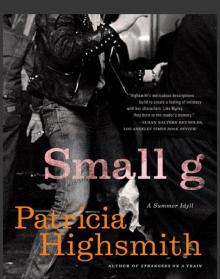 Small G: A Summer Idyll
Small G: A Summer Idyll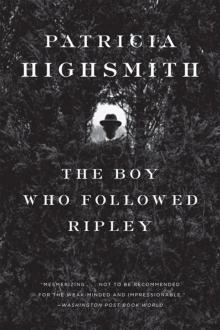 The Boy Who Followed Ripley
The Boy Who Followed Ripley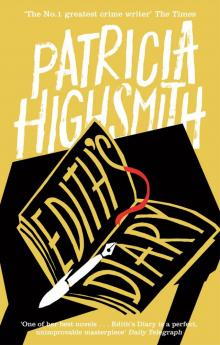 Edith's Diary
Edith's Diary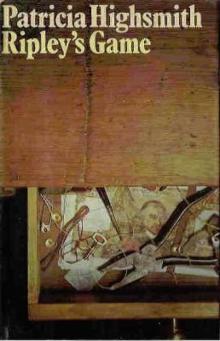 Ripley's Game
Ripley's Game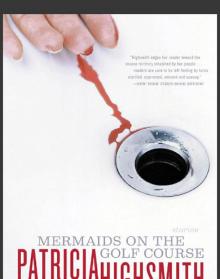 Mermaids on the Golf Course: Stories
Mermaids on the Golf Course: Stories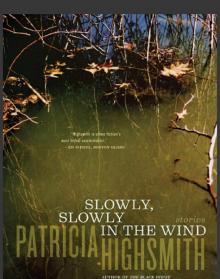 Slowly, Slowly in the Wind
Slowly, Slowly in the Wind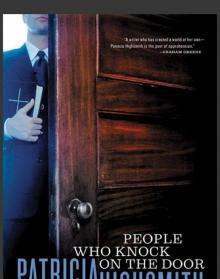 People Who Knock on the Door
People Who Knock on the Door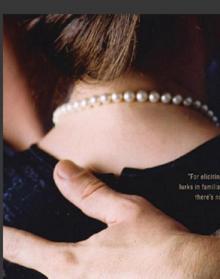 The Glass Cell
The Glass Cell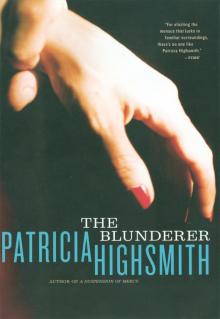 The Blunderer
The Blunderer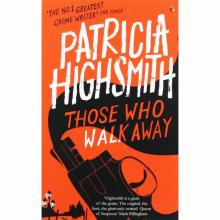 Those Who Walk Away
Those Who Walk Away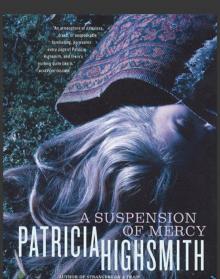 A Suspension of Mercy
A Suspension of Mercy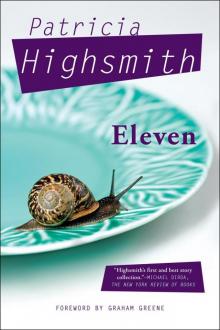 Eleven
Eleven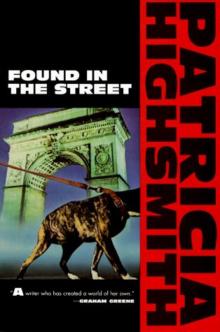 Found in the Street
Found in the Street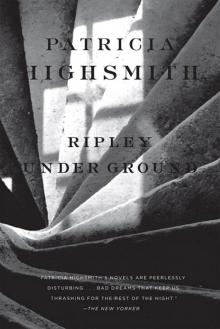 Ripley Under Ground
Ripley Under Ground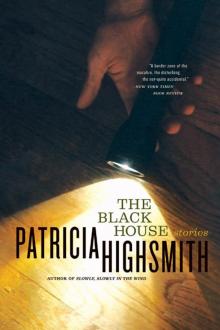 The Black House
The Black House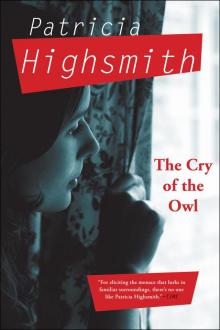 The Cry of the Owl
The Cry of the Owl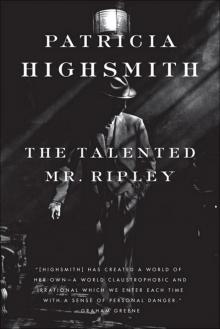 The Talented Mr. Ripley
The Talented Mr. Ripley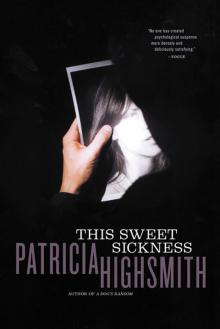 This Sweet Sickness
This Sweet Sickness The Two Faces of January
The Two Faces of January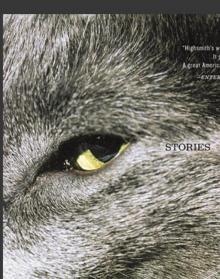 The Animal-Lover's Book of Beastly Murder
The Animal-Lover's Book of Beastly Murder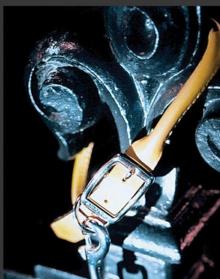 A Dog's Ransom
A Dog's Ransom Deep Water
Deep Water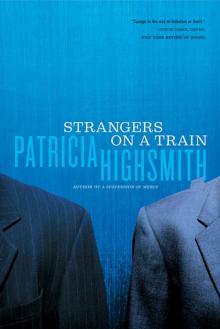 Strangers on a Train
Strangers on a Train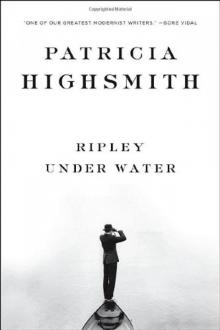 Ripley Under Water
Ripley Under Water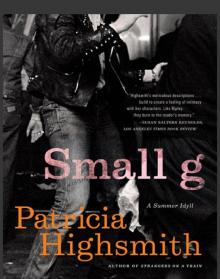 Small g
Small g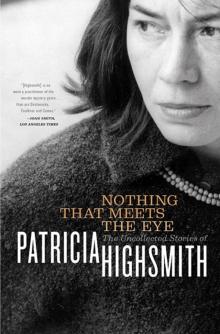 Nothing That Meets the Eye
Nothing That Meets the Eye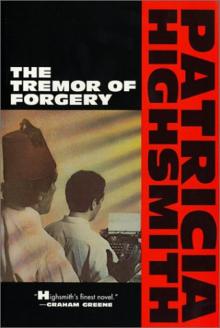 Patricia Highsmith - The Tremor of Forgery
Patricia Highsmith - The Tremor of Forgery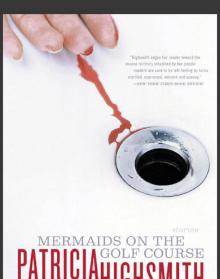 Mermaids on the Golf Course
Mermaids on the Golf Course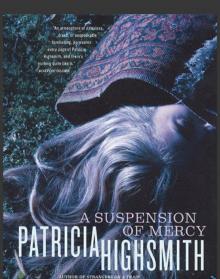 Suspension of Mercy
Suspension of Mercy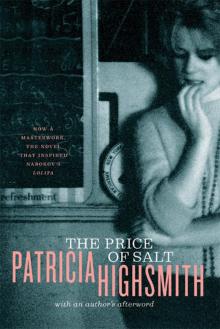 The Price of Salt, or Carol
The Price of Salt, or Carol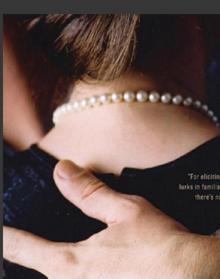 Glass Cell
Glass Cell